英语一般将来时
初中英语语法一般将来时

初中英语语法一般将来时【初中语法系列】一般将来时,结构是重点!一般将来时是初二英语要研究的内容,在初中整个语法系统中占非常重要的内容,也是历次考试的高频考点.1一般将来时的含义一般将来时表示将来某个时间要发生的动作或状态,或将来经常发生的动作或状态。
2一般将来时的基本结构1. will/shall+动词原形will在陈述句中用于各种人称;shall用于第一人称,常被will所代替。
否定式:will not=won'tshall not=shan't一般疑问式:will/shall+主语+动词原形+其他?特殊疑问式:特殊疑问词+一般疑问式?I will/shall do a better job next time.下次我要做得好些。
Oil and water will not mix.油和水没法混在一起。
—Will he help you with your English tonight?今天晚上他会帮助你研究英语吗?—Yes, he will./No, he won't.是的,他会。
/不,他不会。
—When will you arrive for America?你什么时候去美国?—Tomorrow.来日诰日。
2. am/is/are going to +动词原形否认式:am/is/are not going to +动词真相普通疑问式:am/is/are +主语+ going to +动词真相+其他?特殊疑问式:特殊疑问词+普通疑问式?He is going to spend his holidays in London.他打算在伦敦度假。
Look at the dark clouds. There is going to be a storm.看那乌云,快要下雨了。
Is he going to collect any data for us?他会帮我们搜集数据吗?What are you going to do tomorrow?明天你打算作什么?3will+动词原形与am/is/are going to +动词原形的用法区别will+动词原形与am/is/are going to +动词原形的用法虽然都表示将来发生动作或情况,一般情况下能互换。
英语语法一般将来时的含义、结构、用法
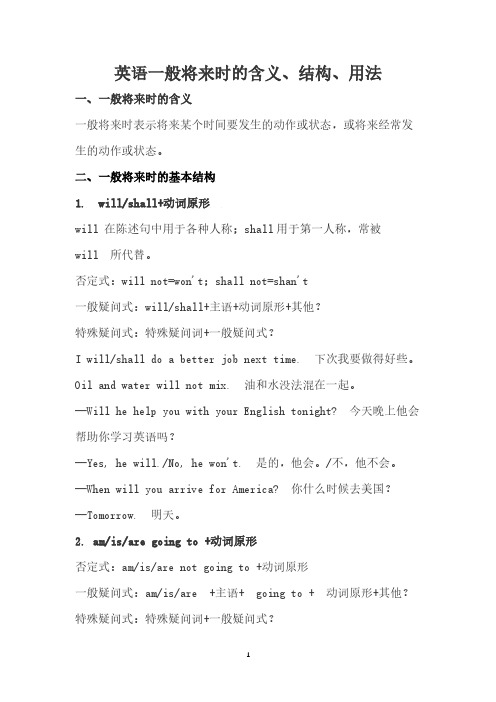
英语一般将来时的含义、结构、用法一、一般将来时的含义一般将来时表示将来某个时间要发生的动作或状态,或将来经常发生的动作或状态。
二、一般将来时的基本结构1. will/shall+动词原形will 在陈述句中用于各种人称;shall用于第一人称,常被will 所代替。
否定式:will not=won't;shall not=shan't一般疑问式:will/shall+主语+动词原形+其他?特殊疑问式:特殊疑问词+一般疑问式?I will/shall do a better job next time. 下次我要做得好些。
Oil and water will not mix. 油和水没法混在一起。
—Will he help you with your English tonight? 今天晚上他会帮助你学习英语吗?—Yes, he will./No, he won't. 是的,他会。
/不,他不会。
—When will you arrive for America? 你什么时候去美国?—Tomorrow. 明天。
2. am/is/are going to +动词原形否定式:am/is/are not going to +动词原形一般疑问式:am/is/are +主语+ going to + 动词原形+其他?特殊疑问式:特殊疑问词+一般疑问式?He is going to spend his holidays in London. 他打算在伦敦度假。
Look at the dark clouds. There is going to be a storm. 看那乌云,快要下雨了。
Is he going to collect any data for us? 他会帮我们收集数据吗?What are you going to do tomorrow? 明天你打算作什么?三、一般将来时的用法will+动词原形与am/is/are going to +动词原形的用法虽然都表示将来发生动作或情况,一般情况下能互换。
一般将来时知识点

一般将来时主要有以下几种表现形式:由助动词shall或will加动词原形构成,shall 用于第一人称,will用于第二、三人称。
除英国外的说英语的国家,在陈述句中,即使在第一人称一般也用will,在英国也有这种趋势。
在口语中,常用shall, will的缩写形式为’ll, 如:I’ll, you’ll等。
Shall not的缩写式为:shan’t, will not 的缩写式为:won’t.肯定句:I/We shall/will go.You/He/She/They Will go.否认句:I/We shall/will not go.You/He/She/They Will not go.疑问句:Shall I/we goWill you/he/she/they go什么叫做一般将来时〔1〕一般将来时表示将要发生的动作或情况。
例如:I will(shall) arrive tomorrow.我明天到。
Will you be free tonight 你今晚有空吗?We won’t (shan’t) be busy this evening. 我们今晚不忙。
〔2〕在一般将来时的句子中,有时有表示将来时间的状语,有时没有时间状语,这时要从意思上判断是否指未来的动作或情况。
例如:Will she come 她〔会〕来吗?We’ll only stay for two weeks. 我们只待两星期。
The meeting won’t last long. 会开不了多久。
〔3〕在以第一人称I或we作主语的问句中,一般使用助动词shall,这时或是征求对方的意见(a),或是询问一个情况(b):a. Where shall we meet 我们在哪儿碰头?b. Shall we have any classes tomorrow明天我们有课吗?在这类问句中,近年来也有不少人用will,特别是在美国。
例如:How will I get there 我怎么去?〔4〕be going to+动词原形a.表示打算、准备做的事。
小学英语一般将来时

be going to句型的特殊疑问句形式。
疑问词 + be动词 +主语 + going (to) +(动作)+(时间副词)?
常用的疑问词有:
what where when which who how
什么(提问事情) 在哪里 (提问地点) 在什么时候 (提问时间) 选择哪一个(提问人或物) 谁 (提问人) 怎么样 (提问方式)
( B ) 9. We ________ the work this way next time. A. do B. will do C. going to do D. will doing
What is Hui Tailang going to do?
He is going to ski.
What is Lan Yangyang going to do?
He is going to sweep the floor.
What is Xi Yangyang going to do?
一般将来时be going to句式的构成: 主语 + be going to +动词原形/地方 +(将来时间)
visit 1. We are going to grandparents tomorrow. 2. Sheisgoing to go soon. read 3. He is going to books this evening. 4. My parents is are going to Beijing next week. is改为 5. John is go to the park.
①通常用will + V说或写都尽量使用“I’ll, You’ll, He‘ll , She’ll , It’ll, We’ll , They’ll …”的简缩形式 否定形式 :will not = won’t I won‘t see him again.
一般将来时___初中语法
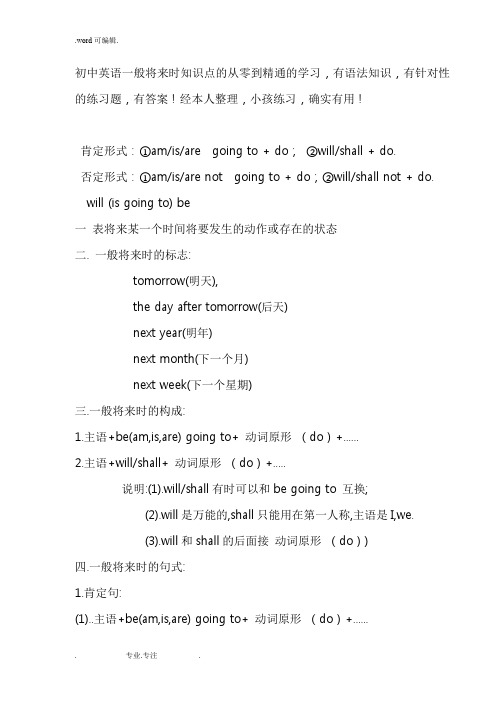
初中英语一般将来时知识点的从零到精通的学习,有语法知识,有针对性的练习题,有答案!经本人整理,小孩练习,确实有用!肯定形式:①am/is/are going to + do;②will/shall + do.否定形式:①am/is/are not going to + do;②will/shall not + do. will (is going to) be一表将来某一个时间将要发生的动作或存在的状态二. 一般将来时的标志:tomorrow(明天),the day after tomorrow(后天)next year(明年)next month(下一个月)next week(下一个星期)三.一般将来时的构成:1.主语+be(am,is,are) going to+ 动词原形(do)+......2.主语+will/shall+ 动词原形(do)+.....说明:(1).will/shall有时可以和be going to 互换;(2).will是万能的,shall只能用在第一人称,主语是I,we.(3).will和shall的后面接动词原形(do))四.一般将来时的句式:1.肯定句:(1)..主语+be(am,is,are) going to+ 动词原形(do)+......(2)..主语+will/shall+ 动词原形(do)+.....2.否定句:(1)..主语+be(am,is,are) not going to+ 动词原形(do)+......(2)..主语+will/shall not+ 动词原形(do)+.....3.一般疑问句:(1).Am/Is,Are+主语+going to+ 动词原形(do)+....(2).Will//shall+主语+ 动词原形(do)+...4.特殊疑问句:(1).What (Where, How...)+be (am,is,are)+主语+ going to + 动词原形(do)+...?(2). What (When,Where,How...) +will/shall+ 主语+ 动词原形(do)+...?二、基本结构:①be going to + do;②will+ do.三、否定句:在be动词(am, is, are)后加not或will后加not成won’t。
英语一般将来时讲解

一般将来时一、一般将来时定义:一般将来时表示将来某一时刻,或将来某一段时间内的动作或状态。
二、一般将来时两个招牌单词will/shall,shall用于第一人称单数,如:shall I…,I shallshall we 。
we shall will则通用三、基本结构will/shall + V原四、缩略形式will 常简略为'll,并与主语连写在一起,如:I'll,he'll,it'll,we'll,you'll,they'll。
例句:Will you be free tonight? 你今晚有空吗?We won’t(shan’t) be busy this evening. 我们今晚不忙。
He’ll go to London next weekWe’ll only stay for two weeks. 我们只待两星期。
We’ll go to the Great Wall if it is fine tomorrow.We shall have a delicious dinner tonight. 今晚我们将美餐一顿。
Shall we go to the park ,tonight ??Tomorrow will be Sunday. 明天就是星期天。
The rain will stop soon. 雨很快就要停了。
Shall we go there at five? 我们五点钟去那儿,好吗?Will you please open the door? 请你把门打开,好吗?五、用法基本用法:“助动词will或shall+动词原形”这一形式,表示将来发生的事情,用于征求对方的意见或表示客气的邀请。
在口语中will用于所有人称,书面语中第一人称常用shall。
如:I can see you're busy, so I won't stay long.我看得出你很忙,所以我不会呆太久。
一般将来时的定义、结构、例句、用法
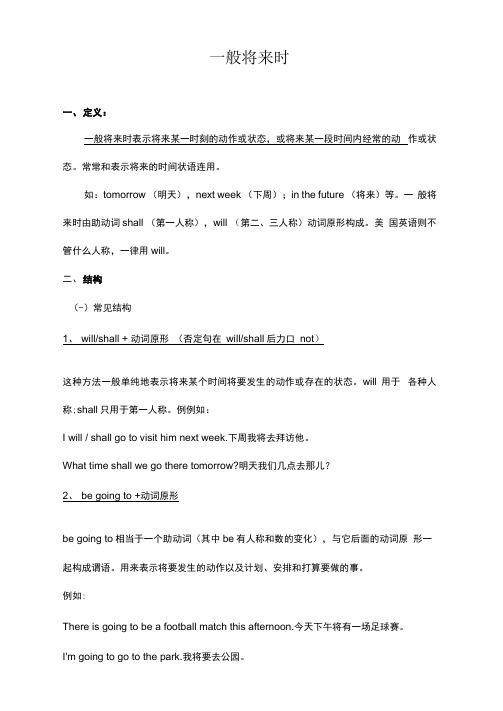
一般将来时一、定义:一般将来时表示将来某一时刻的动作或状态,或将来某一段时间内经常的动作或状态。
常常和表示将来的时间状语连用。
如:tomorrow (明天),next week (下周);in the future (将来)等。
一般将来时由助动词shall (第一人称),will (第二、三人称)动词原形构成。
美国英语则不管什么人称,一律用will。
二、结构(-)常见结构1、will/shall + 动词原形(否定句在will/shall后力口not)这种方法一般单纯地表示将来某个时间将要发生的动作或存在的状态。
will用于各种人称;shall只用于第一人称。
例例如:I will / shall go to visit him next week.下周我将去拜访他。
What time shall we go there tomorrow?明天我们几点去那儿?2、be going to +动词原形be going to相当于一个助动词(其中be有人称和数的变化),与它后面的动词原形一起构成谓语。
用来表示将要发生的动作以及计划、安排和打算要做的事。
例如:There is going to be a football match this afternoon.今天下午将有一场足球赛。
I'm going to go to the park.我将要去公园。
(-)常用结构1、用于"I expect, I'm sure, I think, I wonder 等的宾语从句"中。
Don't worry about the exam. I'm sure you'll pass.不要担心这次考试,我确信你会通过的。
2、用于祈使句和陈述句中。
Work hard and you will succeed.如果你努力,就会成功的。
3、与表示时间或条件的状语从句连用。
一般将来时总结
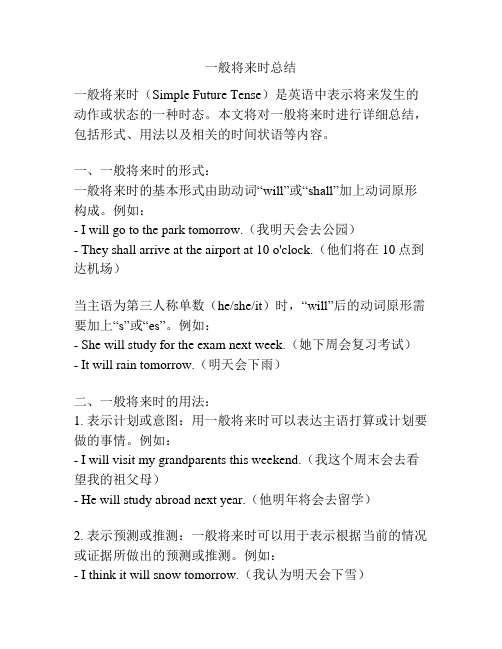
一般将来时总结一般将来时(Simple Future Tense)是英语中表示将来发生的动作或状态的一种时态。
本文将对一般将来时进行详细总结,包括形式、用法以及相关的时间状语等内容。
一、一般将来时的形式:一般将来时的基本形式由助动词“will”或“shall”加上动词原形构成。
例如:- I will go to the park tomorrow.(我明天会去公园)- They shall arrive at the airport at 10 o'clock.(他们将在10点到达机场)当主语为第三人称单数(he/she/it)时,“will”后的动词原形需要加上“s”或“es”。
例如:- She will study for the exam next week.(她下周会复习考试)- It will rain tomorrow.(明天会下雨)二、一般将来时的用法:1. 表示计划或意图:用一般将来时可以表达主语打算或计划要做的事情。
例如:- I will visit my grandparents this weekend.(我这个周末会去看望我的祖父母)- He will study abroad next year.(他明年将会去留学)2. 表示预测或推测:一般将来时可以用于表示根据当前的情况或证据所做出的预测或推测。
例如:- I think it will snow tomorrow.(我认为明天会下雪)- They believe she will win the competition.(他们相信她会赢得比赛)3. 表示意愿或允诺:一般将来时可以表达主语的意愿或承诺要做某事。
例如:- I will help you with your homework.(我会帮你做作业)- He will stop smoking.(他将戒烟)4. 表示预定的事件或安排的计划:一般将来时可以用于表示已经安排好的事件或计划。
英语一般将来时

与一般将来时连用的时间状语
1. We will have a picnic tomorrow. (明天) 明天我们要野餐。 2. He will come back the day after tomorrow. (后天) 后天他将回来。 3. You will see your daughter soon. (很快 不久) 你很快将看到你的女儿。 4. They will get to Beijing in three days. (三天后) 他们三天后将到达北京。 5. What will happen in the future?(在将来) 将来将要发生什么? 6. She will go to Dalian next week. (下周) 下周她将去大连。 7. My dream will come true some day. (将来一天) 将来有一天我的梦想会实现。
;
。
【例句5】 There won’t be blackboards in the classroom in the future. 【归纳5】
There be一般将来时句式变否定句式在will后面 加not,简写为won’t。
跟踪小测2
解题步骤:1.选择正确答案;2.说出你的依据(考查知识点)。 1. There C a football match tomorrow afternoon. A. was B. is going to are C. will be 2. B a lot of books for your classmates next term? A. Are there will B. Will there be C. Will there are 3. --Will there be a computer on your desk? -- C . A. Yes, there is B. No, there aren’t C. No, there Won’t 4. There B any cars on the road in the future. A. will be B. won’t be C. won’t
完整)初中英语一般将来时
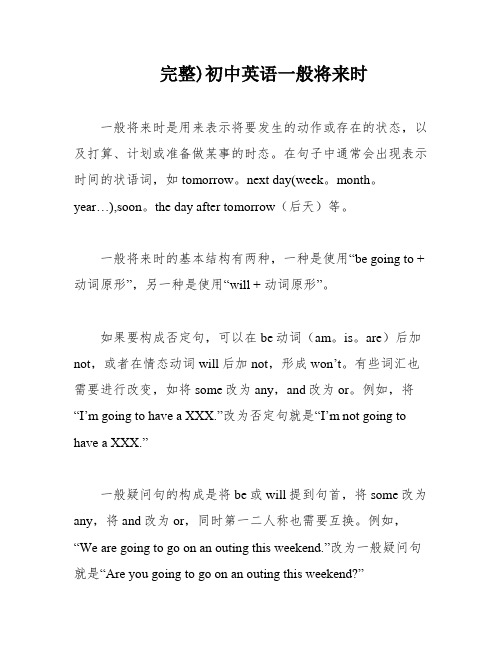
完整)初中英语一般将来时一般将来时是用来表示将要发生的动作或存在的状态,以及打算、计划或准备做某事的时态。
在句子中通常会出现表示时间的状语词,如tomorrow。
next day(week。
month。
year…),soon。
the day after tomorrow(后天)等。
一般将来时的基本结构有两种,一种是使用“be going to + 动词原形”,另一种是使用“will + 动词原形”。
如果要构成否定句,可以在be动词(am。
is。
are)后加not,或者在情态动词will后加not,形成won’t。
有些词汇也需要进行改变,如将some改为any,and改为or。
例如,将“I’m going to have a XXX.”改为否定句就是“I’m not going to have a XXX.”一般疑问句的构成是将be或will提到句首,将some改为any,将and改为or,同时第一二人称也需要互换。
例如,“We are going to go on an outing this weekend.”改为一般疑问句就是“Are you going to go on an outing this weekend?”对于划线部分的提问,一般将来时的对划线部分有三种情况。
第一种是问人,可以使用Who,例如“I’m going to New York soon.”改为问句就是“Who’s going to New York soon?”第二种是问干什么,可以使用What … do,例如“My father is going to watch a race with me this after noon.”改为问句就是“What is your father going to do with you this afternoon?”第三种是问什么时候,可以使用When,例如“She’s going to go to bed at nine.”改为问句就是“When is she going to bed?”同义句的构成是将be going to改为will,例如“I am going to go XXX.”可以改为“I will go XXX.”最基本的一般将来时结构是使用“will + 动词原形”,例如“XXX.”表示明天他们将要参观博物馆。
英语三大一般时态之三——将来时

一般将来时英语三大一般时态之三: 一般将来时一、构成一、构成等时间状语连用。
一般将来时表示将来发生的事。
常与tomorrow, next year等时间状语连用。
二、用法二、用法通常有以下七种方式表示将来,注意它们各自的区别。
1、由will 加动词原形构成,当主语是第一人称时,也可以用shall 加动词原形。
如:Telephone me this evening. I’ll be at home. 今晚给我打电话,我会在家。
今晚给我打电话,我会在家。
I’ll (shall/will) do a better job next time. 下次我要干得好些。
下次我要干得好些。
注意:注意:1)will还可用来表示同意或“不能”。
如:Come and see me tomorrow. Yes,I will. 明天来找我。
——好的。
好的。
不会晚的。
一Don’t be late. 一No,I won’t. 别来晚了。
——不会晚的。
The car won’t start. 车开不了啦。
车开不了啦。
Oil and water will not mix. 油和水没法混在一起。
油和水没法混在一起。
2)在“祈使句+and/or+陈述句”句型中,陈述句中只能用will或情态动词加动词原形。
如:Work hard, and you will pass the exam. 努力学习,你就会通过考试。
努力学习,你就会通过考试。
3)在条件句中表示将来不用will,而用一般现在时、be going to(打算) 或be to(为人所控制的动作) 等。
若你见到在条件句中用了will,那will 就是表示“愿意”的情态动词。
如:Let her do that if she will. 如果她愿意,就让她那样做。
如果她愿意,就让她那样做。
2、be going to 加动词原形,表示主语的意图或打算将来做的事。
如:加动词原形,表示主语的意图或打算将来做的事。
一般将来时的结构和用法及讲解
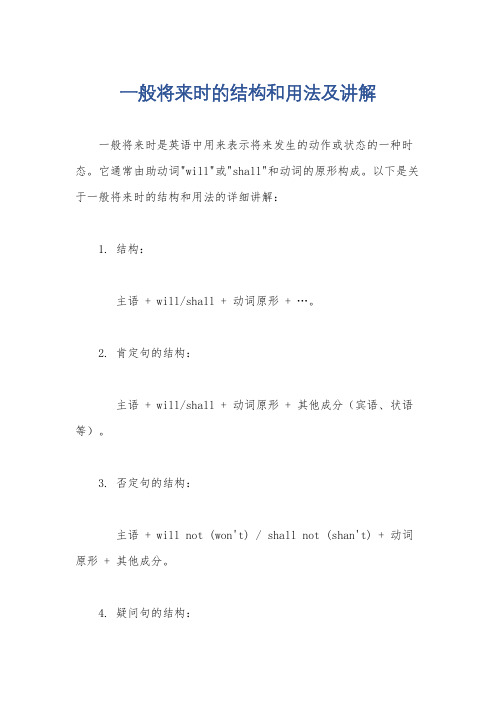
一般将来时的结构和用法及讲解一般将来时是英语中用来表示将来发生的动作或状态的一种时态。
它通常由助动词"will"或"shall"和动词的原形构成。
以下是关于一般将来时的结构和用法的详细讲解:1. 结构:主语 + will/shall + 动词原形+ …。
2. 肯定句的结构:主语 + will/shall + 动词原形 + 其他成分(宾语、状语等)。
3. 否定句的结构:主语 + will not (won't) / shall not (shan't) + 动词原形 + 其他成分。
4. 疑问句的结构:Will/Shall + 主语 + 动词原形 + 其他成分?5. 用法:a. 表示未来的事实、计划或意图,例如,“I will call you later.”(我稍后会给你打电话。
)。
b. 表示预测或假设,例如,“It will rain tomorrow.”(明天会下雨。
)。
c. 表示意愿、请求或承诺,例如,“I will help you with your homework.”(我会帮你做作业。
)。
d. 表示决定,例如,“I will buy a new car.”(我决定买辆新车。
)。
一般将来时的用法相对灵活,可以根据语境和需要进行灵活运用。
需要注意的是,一般将来时中的助动词"will"在口语中常缩写为"‘ll",而否定形式则缩写为"won't"。
同时,在一般将来时中,shall通常用于第一人称(I 和 we),而will则用于其他人称。
在现代英语中,shall的使用已经相对较少,通常用will来表示一般将来时。
初中英语一般将来时
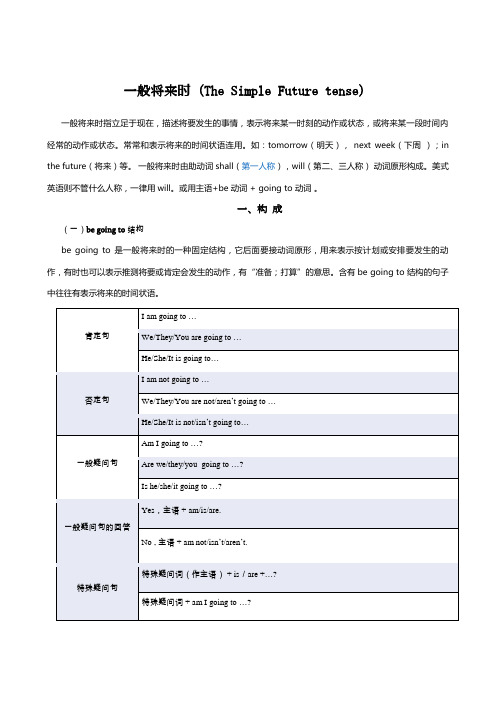
一般将来时(The Simple Future tense)一般将来时指立足于现在,描述将要发生的事情,表示将来某一时刻的动作或状态,或将来某一段时间内经常的动作或状态。
常常和表示将来的时间状语连用。
如:tomorrow(明天),next week(下周);in the future(将来)等。
一般将来时由助动词shall(第一人称),will(第二、三人称)动词原形构成。
美式英语则不管什么人称,一律用will。
或用主语+be动词+ going to 动词。
一、构成(一)be going to 结构be going to 是一般将来时的一种固定结构,它后面要接动词原形,用来表示按计划或安排要发生的动作,有时也可以表示推测将要或肯定会发生的动作,有“准备;打算”的意思。
含有be going to 结构的句子中往往有表示将来的时间状语。
I am going to move to another school next term.下学期我要搬到另一家学校。
He is not going to come to the get-together tomorrow. 他不打算参加明天的聚会了。
——Are they going to leave for Australia next week? 他们下周打算出发到澳大利亚吗?——Yes , they are. / No , they aren’t .是的。
/不。
What are you going to do this evening ?今晚你打算干什么?(二)will 结构I will finish all the housework very soon.我很快就会完成这些家务活。
They won’t move away until tomorrow.他们明天才搬走。
——Will Mr. white give us a lecture tomorrow ?史密斯先生明天给我们作讲座吗?——Yes, he will ./ No , he won’t .是的。
英语一般将来时
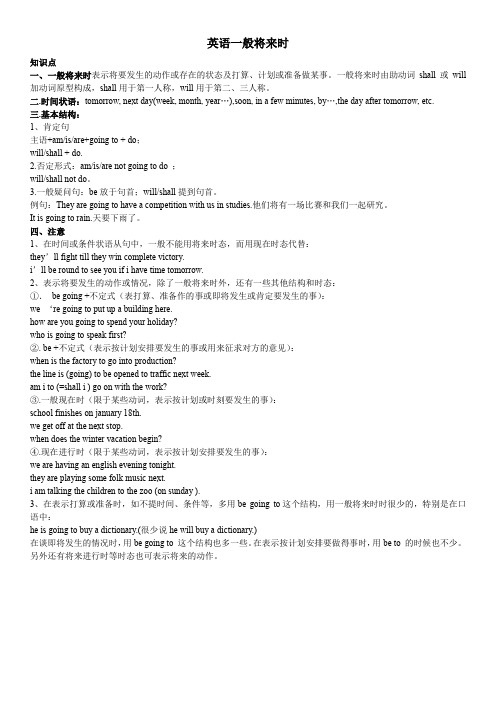
英语一般将来时知识点一、一般将来时表示将要发生的动作或存在的状态及打算、计划或准备做某事。
一般将来时由助动词shall或will 加动词原型构成,shall用于第一人称,will用于第二、三人称。
二.时间状语:tomorrow, next day(week, month, year…),soon, in a few minutes, by…,the day after tomorrow, etc.三.基本结构:1、肯定句主语+am/is/are+going to + do;will/shall + do.2.否定形式:am/is/are not going to do ;will/shall not do。
3.一般疑问句:be放于句首;will/shall提到句首。
例句:They are going to have a competition with us in studies.他们将有一场比赛和我们一起研究。
It is going to rain.天要下雨了。
四、注意1、在时间或条件状语从句中,一般不能用将来时态,而用现在时态代替:they’ll fight till they win complete victory.i’ll be round to see you if i have time tomorrow.2、表示将要发生的动作或情况,除了一般将来时外,还有一些其他结构和时态:①.be going +不定式(表打算、准备作的事或即将发生或肯定要发生的事):we ‘re going to put up a building here.how are you going to spend your holiday?who is going to speak first?②. be +不定式(表示按计划安排要发生的事或用来征求对方的意见):when is the factory to go into production?the line is (going) to be opened to traffic next week.am i to (=shall i ) go on with the work?③.一般现在时(限于某些动词,表示按计划或时刻要发生的事):school finishes on january 18th.we get off at the next stop.when does the winter vacation begin?④.现在进行时(限于某些动词,表示按计划安排要发生的事):we are having an english evening tonight.they are playing some folk music next.i am talking the children to the zoo (on sunday ).3、在表示打算或准备时,如不提时间、条件等,多用be going to这个结构,用一般将来时时很少的,特别是在口语中:he is going to buy a dictionary.(很少说he will buy a dictionary.)在谈即将发生的情况时,用be going to 这个结构也多一些。
一般将来时标志词结构

一般将来时标志词结构一般将来时是英语中一个非常常用的时态,其语态为主动语态,表示将要发生的动作或状态。
在句子中,一般将来时通常使用助动词will或shall加动词原形来构成。
除此之外,还有一些常用的标志词,它们在一般将来时中起着重要的连接作用,下面就让我们了解一下这些标志词的用法和特点。
1. tomorrow(明天)Tomorrow I will go to the park.(明天我将去公园。
)2. next week/month/year(下周/月/年)Next week I will start my new job.(下周我将开始我的新工作。
)3. in the future(将来)In the future, I will travel around the world.(将来,我将周游世界。
)4. soon(很快)He will be here soon.(他很快就会到这里。
)5. later(稍后)I will finish my work later.(我稍后会完成我的工作。
)6. at this time tomorrow(明天这个时候)At this time tomorrow, we will be on the train.(明天这个时候,我们将在火车上。
)7. by the end of(到……结束时)I will have finished this book by the end of the week.(到本周结束时,我会把这本书看完。
)通过学习这些标志词,我们可以更好地掌握一般将来时。
同时在实际运用时,我们也要注意使用标志词与助动词配合的语法结构,这样才能正确地表达自己的意思,让对方更好地理解。
英语一般将来时的五种表达方法
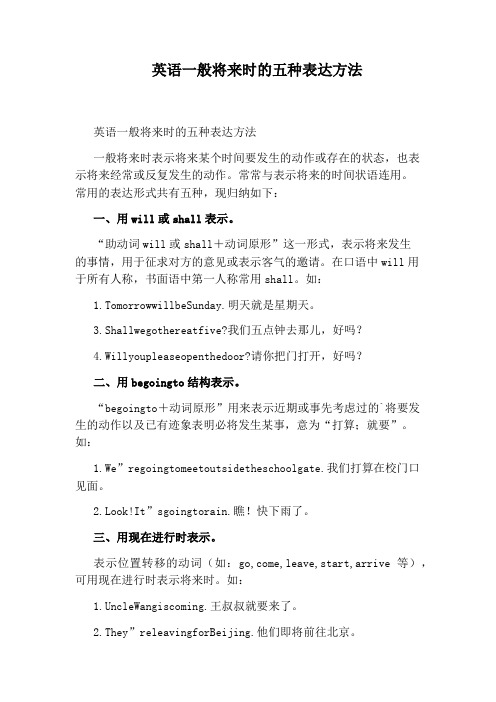
英语一般将来时的五种表达方法英语一般将来时的五种表达方法一般将来时表示将来某个时间要发生的动作或存在的状态,也表示将来经常或反复发生的动作。
常常与表示将来的时间状语连用。
常用的表达形式共有五种,现归纳如下:一、用will或shall表示。
“助动词will或shall+动词原形”这一形式,表示将来发生的事情,用于征求对方的意见或表示客气的邀请。
在口语中will用于所有人称,书面语中第一人称常用shall。
如:1.TomorrowwillbeSunday.明天就是星期天。
3.Shallwegothereatfive?我们五点钟去那儿,好吗?4.Willyoupleaseopenthedoor?请你把门打开,好吗?二、用begoingto结构表示。
“begoingto+动词原形”用来表示近期或事先考虑过的`将要发生的动作以及已有迹象表明必将发生某事,意为“打算;就要”。
如:1.We”regoingtomeetoutsidetheschoolgate.我们打算在校门口见面。
2.Look!It”sgoingtorain.瞧!快下雨了。
三、用现在进行时表示。
表示位置转移的动词(如:go,come,leave,start,arrive等),可用现在进行时表示将来时。
如:1.UncleWangiscoming.王叔叔就要来了。
2.They”releavingforBeijing.他们即将前往北京。
四、用一般现在时表示。
根据规定或时间表预计要发生的动作,在时间和条件状语从句中,都可用一般现在时表示将来时。
如:1.Thenewtermstarts(begins)onAugust29th.新学期八月二十九日开学。
2.Ifitdoesn”traintomorrow,we willgooutforapicnic.如果明天不下雨,我们将出去野餐。
五、用“be+动词不定式”或用“beaboutto+动词原形”的结构表示。
如:1.HeistovisitJapannextyear.明年他将访问日本。
英语一般将来时

练一练
用所给动词的适当形式填空:
1. Will he___d_o_____(do) homework? 2.He__w_i_ll_b__u_y__ (buy) some fruits tomorrow. 3. There’s no fruits in the fridge. He_i_s_g_o__in_g__t_o__b_u_y__(buy) some fruits tomorrow. 4.It’s getting dark outside. It_is__g_o__in_g__t_o__ra_i_n_(rain).
练一练
二、改写句子
1.Nancy is going to go camping.(改为否定句) Nancy is not/isn’t going to go camping. 2.I shan’t go and join them. (改为肯定句) I shall go and join them. 3.we will meet at the gate at 10:00.(改为一般疑问句) Will you meet at the gate at 10:00? 4. She is going to swim after school.(对划线部分提问) What is she going to do#43;动词原形结构定义:表示主观的打算或计划,一般指近事先考虑 过或计划的将要发生的动作,或有迹象表明必将发生的事,意为 “打算,想要”。 如:I’m going to play ping-pong with Tom. 否定句结构本质是在be动词后面加not,主语+be not going to+动词原形+其他 如:I am not going to play ping-pong with Tom. 一般疑问句本质是把be动词提到句首,即:Be+主语+going to+动词原形+其他 如:Are you going to play ping-pong with Tom? 特殊疑问句:疑问词+be+主语+going to+动词原形+其他 如:What are you going to do tomorrow?
一般将来时的语法规则
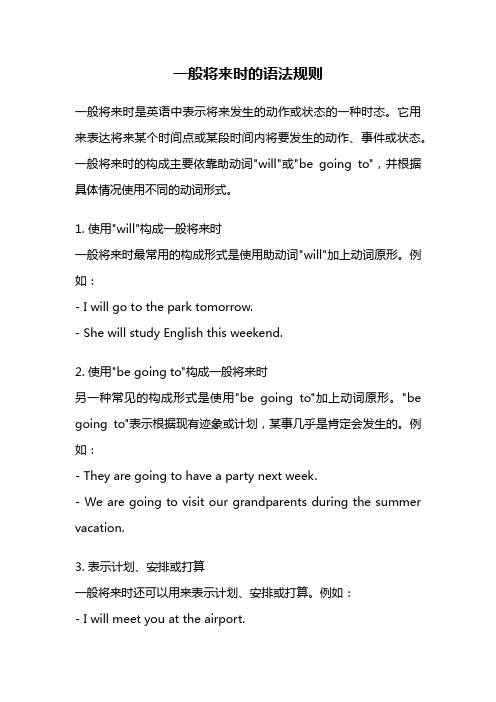
一般将来时的语法规则一般将来时是英语中表示将来发生的动作或状态的一种时态。
它用来表达将来某个时间点或某段时间内将要发生的动作、事件或状态。
一般将来时的构成主要依靠助动词"will"或"be going to",并根据具体情况使用不同的动词形式。
1. 使用"will"构成一般将来时一般将来时最常用的构成形式是使用助动词"will"加上动词原形。
例如:- I will go to the park tomorrow.- She will study English this weekend.2. 使用"be going to"构成一般将来时另一种常见的构成形式是使用"be going to"加上动词原形。
"be going to"表示根据现有迹象或计划,某事几乎是肯定会发生的。
例如:- They are going to have a party next week.- We are going to visit our grandparents during the summer vacation.3. 表示计划、安排或打算一般将来时还可以用来表示计划、安排或打算。
例如:- I will meet you at the airport.- She is going to take a vacation next month.4. 表示预测、推测或判断一般将来时还可用来表示预测、推测或判断。
例如:- It will rain tomorrow.- The price of oil is going to increase.5. 使用时间状语和频率副词在一般将来时的句子中,可以使用时间状语词或频率副词来指明动作发生的时间或频率。
例如:- He will come to the party tonight.- They are going to travel to Europe next year.6. 否定形式和疑问形式在一般将来时的句子中,要表示否定形式,只需在助动词"will"前加上"not"。
- 1、下载文档前请自行甄别文档内容的完整性,平台不提供额外的编辑、内容补充、找答案等附加服务。
- 2、"仅部分预览"的文档,不可在线预览部分如存在完整性等问题,可反馈申请退款(可完整预览的文档不适用该条件!)。
- 3、如文档侵犯您的权益,请联系客服反馈,我们会尽快为您处理(人工客服工作时间:9:00-18:30)。
英语一般将来时
英语动词的一般将来时,主要表示:
1.一般将来时由“shall或will + 动词原形”构成。
第一人称后用shall (也可用will),在其他情况下都用will,常常紧缩为“’ll”。
但在疑问句第一人称后用shall时较多,来征求对方意见:
Shall we ( I ) sit here? 我们(我)要不要坐这里?
一般将来时主要表示将要发生的动作或情况:
You'll arrive at 12:50. 你将在12点50分到达。
We shall say good-bye to him. 我们将和他道别。
We'll meet at the airport. 我们将在机场见面。
I'll have some orange juice. 我喝点橘汁。
She will take the 11:18 train. 她将搭11点18分的火车。
2.一般将来时的肯定、否定、疑问及简短回答形式如下:
肯定句
I (We) will ( shall) come.
You (He, She, They) will come.
否定句
I (We) will (shall) not come.
You (He, She, They) will not come.
疑问句
Shall I (we) come?
Will you (he, she, they) come?
简短回答
Yes, I will (shall).
you ( he, she, they) will.
No, I won't (shan't).
you ( he, she, they) won't.
3.将来发生的事还可以其他方式表示:
1)一般现在时(仅限于少数动词):
The boat sails early next morning. 船明天一早启航。
The plane takes off at 1:18. 收音机1点18分起飞。
现在进行时(仅限于少数动词):
She's coming home by bus. 她坐公共汽车回家。
They're flying home. 他们将坐飞机回家。
还可以用be going to结构表示。
还有少数其他将来时态后面再谈。
但在条件及时间状语从句中多用一般现在时代替一般将来时:
Come to our dinner party if you have time.
如果你有时间请来参加我们的聚会餐。
I'll bring you the book when I come next time.
下次来时我会把书给你带来。
